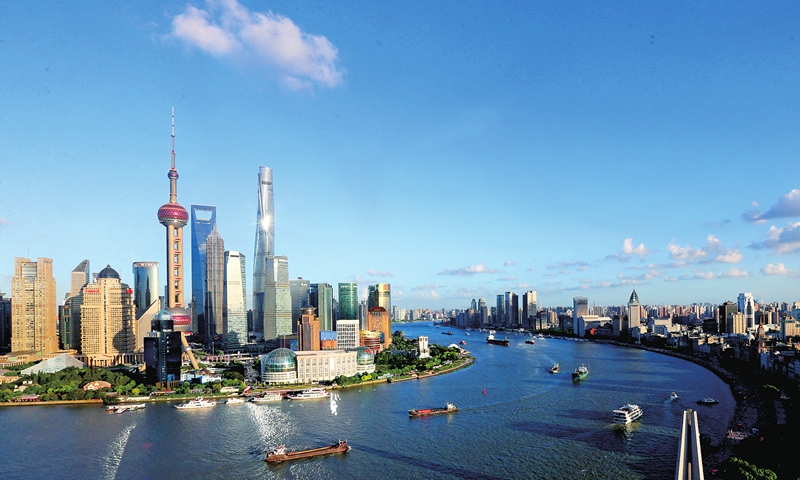Shanghai’s unique status requires zero-COVID approach with minimum cost

File photo shows a view of the Lujiazui area in Shanghai, east China. (Photo: Xinhua)
As Shanghai, China's largest city and a main economic, trade and financial hub, adopted what appears to be a new approach to contain the highly contagious Omicron variant in the city - by imposing temporary closed-off management in certain parts of the city, while refraining from citywide closures, domestic and global attention will focus on whether the city will be able to stem the virus, while minimizing the economic costs.
This is a test for not just Shanghai but the entire country, as China generally continues to adopt the dynamic zero-COVID strategy, while much of the rest of the world has gradually eased their anti-epimidec efforts, but the need to further minimize the social and economic costs becomes increasingly significant given the protracted epidemic.
Here is what Shanghai has done so far. The city has imposed closed-off management in regions east of the Huangpu River to carry out nucleic acid testing starting from 5 am Monday to 5 am Friday, and closed-off management will be enforced in Puxi, west of the river, from 3 am Friday to 3 am April 5.
The approach is very different from citywide closed-off management seen in various Chinese cities since the outbreak of the COVID-19. For example, Southern Chinese metropolis Shenzhen authorities recently imposed strict citywide anti-epidemic measures for a week before announcing the resumption of normal work and production on Sunday.
With its new approach, Shanghai's airports, railway stations and international shipping ports are still operating normally, while major manufacturers in the city will be able to resume production after a brief hiatus.
Since the outbreak of this round of epidemic, Shanghai, seen as a model of China's COVID-19 controls, has been facing great pressure for making bold and difficult trial in exploring new epidemic prevention approaches that could not only identify silent carriers but also ensure minimal impact on economic and social activities.
The pressure - or expectation - for Shanghai to explore more effective anti-epidemic measures has a great deal to do with Shanghai's unique status within the Chinese economy.
Shanghai is not just the largest city in China, but also the world's leading economic, financial, shipping and trade center. On a daily basis, Shanghai records an average of 11.8 billion yuan ($1.85 billion) in GDP, 4.2 billion yuan in taxation, 11.1 billion in trade. It is not exaggeration to say that if Shanghai were put under citywide, strict closed-off management, the results will cascade into a significant negative impact on the whole Chinese economy as well as certain aspects of the global economy.
Shanghai is also of great importance to global supply chains. The Shanghai Port's container throughput reached 47.03 million TEU in 2021, ranking first in the world for the 12th consecutive year. With total trade through the Shanghai Port reaching 10.09 trillion yuan in 2021, Shanghai is one of the busiest import and export ports for China's high-tech industry, and a smooth trade flow of high-tech products is crucial to the stability of the entire industrial chain.
Moreover, Shanghai is one of the world's top international financial centers. The city's normal operation is vital to maintaining its status as a financial center.
Such unique and important position involving so many key industries determines that Shanghai must find a new approach in combating the COVID-19 - one that can achieve the dynamic zero-COVID target, while minimizing disruptions to the economy.
To a great extent, Shanghai's pursuit of a more cost-efficient approach is in sync with the practical needs of the Chinese economy. For China, what is most important now is how to prevent the epidemic from excessively affecting the economy, while striving to achieve the greatest prevention and control effect. In this regard, Shanghai's performance will be of great significance for the entire Chinese economy and the country's anti-epidemic efforts this year in terms of minimizing disruptions to normal social and economic activities.
Certainly, there are great challenges and difficulties during the exploration process, like how Shanghai is facing huge pressure at the moment. But the Chinese society and the economy need such attempts and breakthroughs, and Shanghai is uniquely qualified to strive for that.
Photos
 Increasingly more young adults in China register wills that include virtual assets
Increasingly more young adults in China register wills that include virtual assets Rapeseed flowers turn NW China's Luoping into picturesque spring wonderland
Rapeseed flowers turn NW China's Luoping into picturesque spring wonderland Why do people in China fall for animated characters like LinaBell and Bing Dwen Dwen?
Why do people in China fall for animated characters like LinaBell and Bing Dwen Dwen? Photo Album: architecture in Beijing merging history and modernity
Photo Album: architecture in Beijing merging history and modernity
Related Stories
- Shanghai enters partial ‘pause’, vows sufficient daily supplies
- Shanghai tightens COVID-19 control measures amid resurgence
- COVID-19 antigen test kits sold at Beijing's pharmacies
- Over 14 million Shanghai residents take COVID-19 antigen testing
- Shanghai quarantines mild cases, asymptomatic carriers at designated venues
Copyright © 2022 People's Daily Online. All Rights Reserved.






